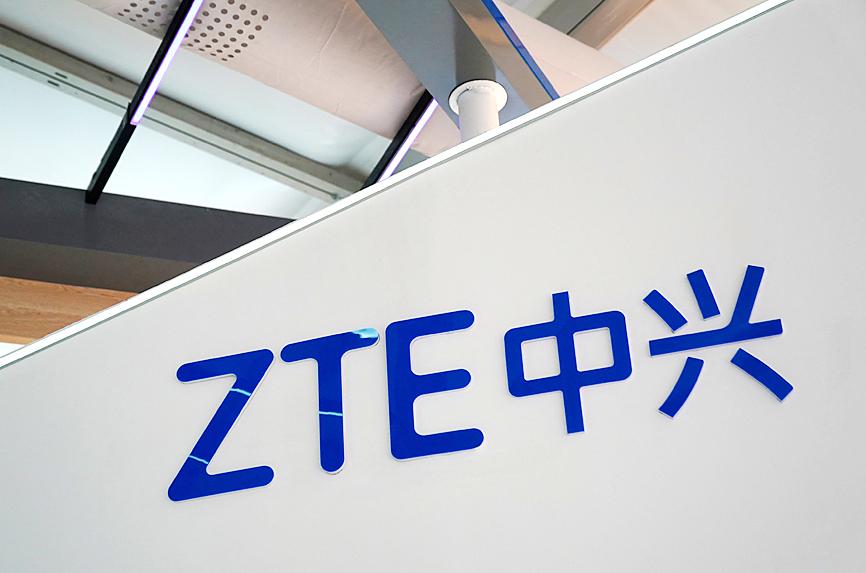A US judge on Tuesday ruled that China’s ZTE Corp (中興通訊), a top telecommunications equipment maker, should be allowed to end its five-year probation from a 2017 guilty plea.
The ruling came on the final day of the company’s probation for illegally shipping US technology to Iran.
It marks the end of a criminal case against ZTE, although it is still subject to a 2018 settlement agreement with the US Department of Commerce.

Photo: Tingshu Wang, Reuters
ZTE had been accused of breaching probation over an alleged conspiracy to commit visa fraud.
An indictment unsealed in March last year said that a former ZTE research director and a Georgia Institute of Technology professor allegedly conspired to bring Chinese nationals to the US to conduct research at ZTE from at least 2014 through 2018 while on J-1 visas sponsored by the university.
While ZTE has not been charged in the visa case, which is pending in Atlanta, Georgia, US District Judge Ed Kinkeade last week held a hearing in Dallas, Texas, on the fraud allegation as a possible breach of ZTE’s probation.
In his ruling on Tuesday, the judge found ZTE was legally responsible for the actions of the former ZTE director.
However, he decided to not take any further action against ZTE, which had reached the maximum term of probation and, ZTE argued, had also been fined the maximum.
As part of its 2017 guilty plea deal, ZTE paid US$892 million.
There was an “open question about legal tools left for the court,” the judge wrote.
Despite the favorable ruling, the judge encouraged the government to pursue any reasonable charges, and criminal or civil penalties, against the company, especially over export compliance matters.
The visa issue was not the first problem that surfaced for ZTE since the plea deal. In 2018, the US Department of Commerce found that ZTE made false statements about disciplining executives tied to the illegal shipments to Iran and, as a result, issued a total ban on the company buying US components.
ZTE, crippled by the move, paid a US$1 billion penalty and agreed to change its leadership and cooperate with a second 10-year monitor, as part of an agency agreement lifting the ban.
In 2018, the judge also took action over the false statements, extending ZTE’s probation and court-appointed monitor from three to five years.
In his ruling on Tuesday, the judge said that ZTE argued that the visa-fraud related events occurred more than three years ago, and that new leadership had brought an improved export compliance program.
“The company has made strides,” the judge said, adding that ZTE’s export control and compliance programs were effectively “nonexistent” when it was originally sentenced.
He said he considered ZTE’s compliance a mitigating factor, but that its record on compliance could be summarized in one word: “Sometimes.”
ZTE in a statement said that it is “proud of the significant improvement in the company’s compliance program and culture.”
It said the improvement has been acknowledged over the years.

Intel Corp chief executive officer Lip-Bu Tan (陳立武) is expected to meet with Taiwanese suppliers next month in conjunction with the opening of the Computex Taipei trade show, supply chain sources said on Monday. The visit, the first for Tan to Taiwan since assuming his new post last month, would be aimed at enhancing Intel’s ties with suppliers in Taiwan as he attempts to help turn around the struggling US chipmaker, the sources said. Tan is to hold a banquet to celebrate Intel’s 40-year presence in Taiwan before Computex opens on May 20 and invite dozens of Taiwanese suppliers to exchange views

Application-specific integrated circuit designer Faraday Technology Corp (智原) yesterday said that although revenue this quarter would decline 30 percent from last quarter, it retained its full-year forecast of revenue growth of 100 percent. The company attributed the quarterly drop to a slowdown in customers’ production of chips using Faraday’s advanced packaging technology. The company is still confident about its revenue growth this year, given its strong “design-win” — or the projects it won to help customers design their chips, Faraday president Steve Wang (王國雍) told an online earnings conference. “The design-win this year is better than we expected. We believe we will win

Chizuko Kimura has become the first female sushi chef in the world to win a Michelin star, fulfilling a promise she made to her dying husband to continue his legacy. The 54-year-old Japanese chef regained the Michelin star her late husband, Shunei Kimura, won three years ago for their Sushi Shunei restaurant in Paris. For Shunei Kimura, the star was a dream come true. However, the joy was short-lived. He died from cancer just three months later in June 2022. He was 65. The following year, the restaurant in the heart of Montmartre lost its star rating. Chizuko Kimura insisted that the new star is still down

While China’s leaders use their economic and political might to fight US President Donald Trump’s trade war “to the end,” its army of social media soldiers are embarking on a more humorous campaign online. Trump’s tariff blitz has seen Washington and Beijing impose eye-watering duties on imports from the other, fanning a standoff between the economic superpowers that has sparked global recession fears and sent markets into a tailspin. Trump says his policy is a response to years of being “ripped off” by other countries and aims to bring manufacturing to the US, forcing companies to employ US workers. However, China’s online warriors